From Hippos to Grasshoppers
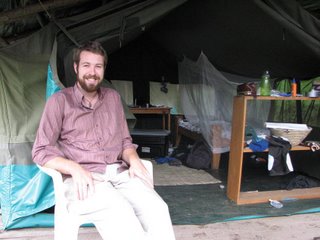
I am attempting to actually give order to these pictures, instead of posting them as a mass at the top. There is a good chance I will butcher it. To start, this is me by my tent in Rubingo. It took some time, but as you can see, I've turned it into a pig sty like my room back home. Very comfortable. This is where I have lived for most of the trip, and that chair on the little deck is my favorite place to sit.
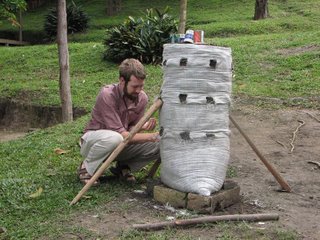
Here I am again! This time, I am planting a sack garden. As you look at this picture, it will surely become evident what exactly a sack garden is. For those who still don't get it, it is a sack with dirt in it, then holes in the side. We plant seeds in the soil, then they grow. Ingenious. It is, however, a great method of planting for people with little land. Since that picture was taken, the seeds have already germinated and have begun to grow. Everything here grows amazingly fast, with a perfect mix of rain and sun every day.

Here I am standing in front of the house I lived in for a little while in Kikagati (Chi-ka-gati), another ACTS project site on the border of Uganda and Tanzania.
We carried bricks from a nearby plantation back to the house to build bookshelves. These little kids decided that they would help us, and we scuffled to and from the kiln, John (another intern) and I carrying three bricks, the little guys each taking one. The man I am standing next to is named Johnson, and he is an ACTS worker. He is in charge of the widows groups, and he and I went down to Kikagati to help start up a similar project. We were able to make a deal with the arch deacon, and if ACTS approves, will be able to provide land for a communal widow's, widower's, and orphan's garden.
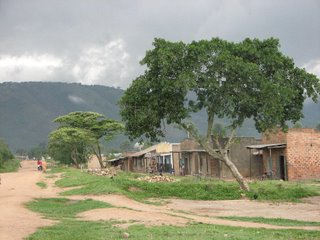
This is a picture of Kikagati. John and I lived in one of those cement buildings you see. Our little compound was shared with the owner of the property, Ezra, and his family. They had three little boys, and actually, come to think of it, a couple of them are in the picture above.
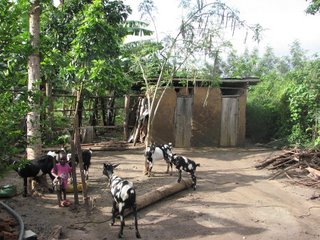
Here are the latrines at our place in Kikagati. To get to them, we had to walk by Ezra's home, then through the goats. His youngest is the kid in the pink that is loitering with the embuzi (goat). It's definitely a race to get in and out of those as quickly as possible. My bathroom comfort zone has been drastically expanded.
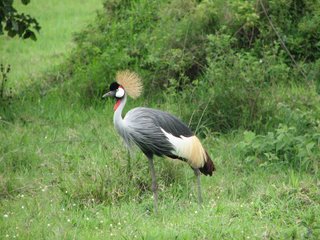
To the left of this text (ideally) is a picture of the crested crane. It's the bird that is featured on the Ugandan flag, and every so often we run into a pair. We saw this one on the bumpy drive from Rubingo to Kikagati.
Below is a picture of Stella, an amazing woman who ACTS trained to help distribute bio sand filters in the community. The sand filters are huge (4 ft tall) blue cement structures. Water is poured into the top, where it passes through a bio layer, then through sand, and finally rocks. The bio layer is formed from the bacteria already present in the water. Somehow, the layer catches other bacteria, and the water comes out much cleaner. Some of the uneducated Ugandans contribute the cleansing ability to charms or magic, and I can't say that I perceive it much more accurately. We tested some of the water for e. coli before and after passing through the filter, and amazingly, if not magically, the e. coli was decreased by about half. But back to the picture. This is a water catchment in Kikagati. It is a very dry area- pretty typical African savannah look, so there is no natural source in the hills. This means the people have no real way to get water. The catchment is meant to capture rain water, but unfortunately, people have to climb down a ladder to fill up their jerry cans, their poo covered feet contaminating the source in the process. The algae isn't that big of a deal, but the fecal contamination causes all sorts of trouble. They hike for miles/kilometres (keep in mind I am catering to an international audience) and fill up big yellow jerry cans with the brown sludge, then effortlessly put them on their heads and walk back. When full, those jugs are freaking heavy, too! I struggle to carry them at all, granted I am not quite rippling with muscle, but at least I have protein in my diet and generally eat a couple of meals a day!
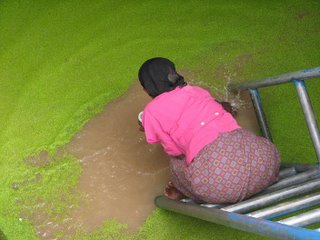
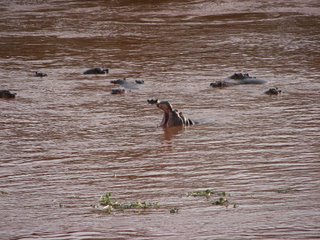
Here are some hippos! We decided to go on a self-guided safari in Kikagati. We had heard there were hippos just up river of the border crossing, so we set out along a pseudo-road, dodging cows and acacias. The outing was called hippo hunting, and scheduled into our program for the week. John, Johnson, Elly (another Ugandan staff member- the one in the black bandana below) and I set out with our best hunting gear. Johnson wore a sweet poacher's hat, accompanied by John's Rwandan goat skin-sheathed sword. We picked up a local man to help direct us, and he brought us right to the hippos. In exchange he asked for food, blaming the current famine. We didn't have food with us, but were more than happy to pay him for his services.
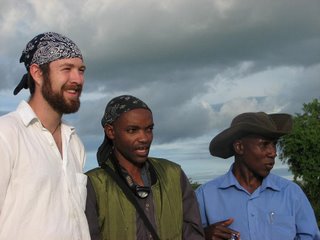
We sat and stared like this for about an hour, watching the hippos sink into the Kyger river, then float back to the top. They roared and grunted like crazy. We were on a ridge about 20 feet above the river where they swam and I couldn't believe how well we could hear all their noises.
Lastly, below is a picture of the Kikagati radio station. It is run by ACTS, and sits on top of a giant hill overlooking the former Kikagati game reserve (the lions and other animals were all hunted out during the days of idi amin), and also the current game reserve right across the river in Tanzania. The DJ, Paul, has a small tape player with headphones where he samples the tapes and rewinds to the right spot, and a second tape player hooked up to an 80s mixer. That is the entire radio station, which the whole community tunes to every day. Pretty simple stuff, but completely functional.
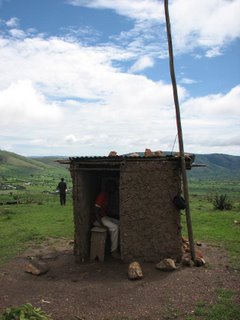
So the week spent in Kikagati was very successful. We managed to set up a framework for new widow's groups and gardens, which went very smoothly. On the way back to Rubingo I met Perez (yet another Ugandan worker) and he and I bought 800 baby nile tilapia for two fish ponds in the Rubingo area. Last year, the agricultural intern made an agreement with the community stating that ACTS would provide fish fry for any farmer who dug his own pond. Two pretty wealthy groups complied, and we followed through with the deal. We also attached a condition to the agreement that allows any member of the widows groups a discount on fish as soon as the tilapia are mature. I have to admit I was a bit bitter about assisting the middle class farmers, when there are many many more needy people. But, in a place where one is considered wealthy if he has a concrete home, a bit of land to grow bananas, and two or three goats, I suppose I shouldn't be too picky about who needs help.
Back in Rubingo, things slipped back into the normal groove, where we work during the day and relax in the evening. Tenessa and I were the only ones at camp, so we initiated medical music nights, where each night we studied a topic. We actually only got through two topics- HIV and worms. I now have a detailed knowledge of the clinical stages of HIV and the many many many different types of worms here. Worms, by the way, are something I am almost sure to contract, mostly because of wearing sandals. There is manure everywhere, so if any cow had some worms, they can slip up under my toenails, enter my intestine, lay eggs which slip into my blood stream, then end up in my lungs. I'll cough up the larvae, swallow them (without knowing it) and start the cycle all over! Don't worry though, it just takes one pill to get rid of them.
As long as we are on the topic of health, yesterday at Rubingo, a man came to the clinic with his two sons. Both were obviously disabled, as they couldn't speak clearly and drooled a ton. Turns out they are epileptics, and rarely have anti-seizure medication. We agreed to drive them to a government clinic where they could get more medicine. In the hour that I drove the little family, one of the boys had four seizures in the back seat of the truck. It was pretty horrifying to be honest. Seizures are violent events, and in normal (north american) circumstances we would consider them to be a pretty big deal. Here, there was nothing we could do but keep driving. By the end of the day, the truck reeked of urine and I had lost my appetite. Luckily, we were able to get them more medication, and even were informed of a clinic near the man's home where he can get more medication for much cheaper.
On a lighter note.
One more important thing I almost forgot! And it's in the title! Grasshopper season has arrived. Grasshoppers are a Ugandan delicacy that people collect by the sack full. I bought a bag (about as big as a plastic grocery store bag) stuffed full with live grasshoppers for 2000 shillings (1.30). I took them back to camp and Tenessa and I were given a lesson on grasshopper preparation. We take the live insects in our hand, rip off their legs and wings, then throw their still wriggling limbless bodies onto a plate. The cooks were pros, they grabbed 10 at a time and had them de-legged and de-winged in seconds, while Tenessa and I struggled with the fighting bugs, often losing hold of them and having to chase our food. They then fried them up, but no need for veggie oil, the grasshoppers have enough of their own oil. They're heavily salted, and turns out in the end freaking delicious. I couldn't believe it, but I probably ate 40. They're crispy and tasty. I can't explain it, you'll all just have to come to Uganda to try for yourself.
2 minutes left on the internet. I'm going to attend a regional drama competion here in a bit where all the HIV/AIDS groups perform plays and music. Tomorrow takes all 11 of us to Kamala, then to Jinja where we will raft the NILE! I'll be sure to give you a detailed update later this weekend.

1 Comments:
Wow Graeme another wonderful post to read. I think you are really becoming comfortable in your new habitat. I can't wait to hear about your raftig trip on the Nile! you may be qualified as a guide ya know! When will we see yo again here in CA?
Post a Comment
<< Home